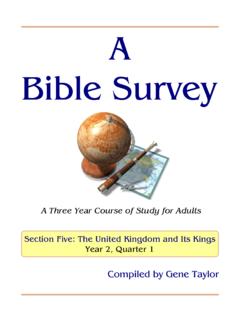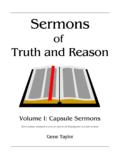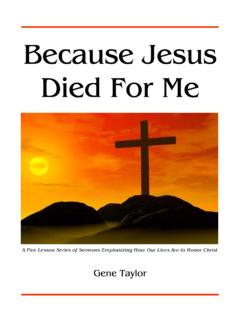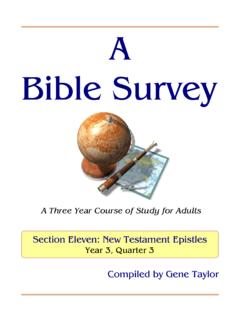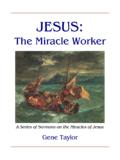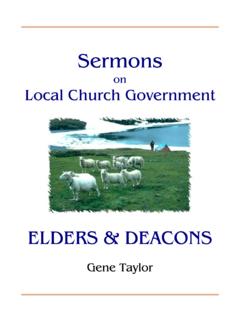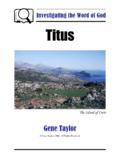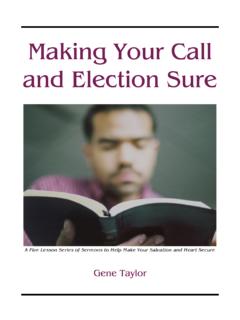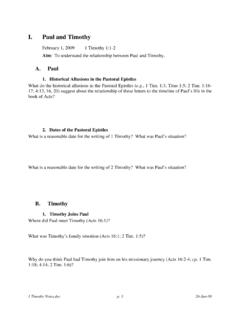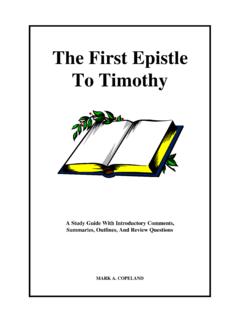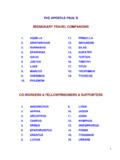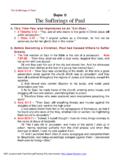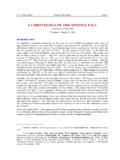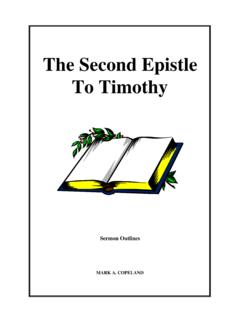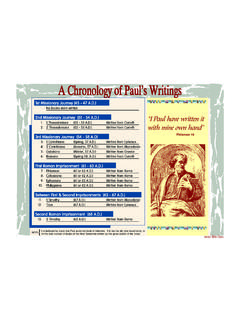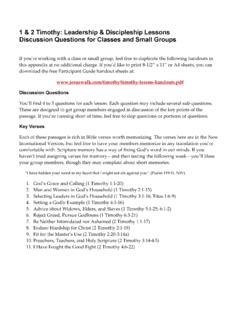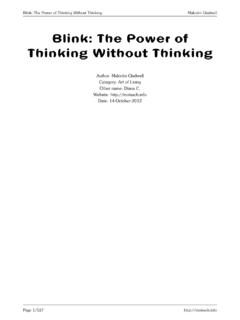Transcription of Investigating the Word of God Second Timothy
1 Investigating the Word of God Second Timothy Gene Taylor Gene Taylor, 2006. All Rights Reserved. An Introduction to Second Timothy Timothy , the Man The name Timothy is the English form of the Greek Timotheus. The name originally meant honoring God.. Timothy was born in the city of Lystra of a Greek father and a Jewish mother. He was reared in the Jewish faith and was taught the Scriptures by his mother and grandmother from early childhood. (2 Tim. 3:15; 1:5). The apostle Paul discovered him at Lystra (Acts 16:1-3). He joined Paul in his labors and shared in them throughout the rest of his life. He was with Paul in prison in Rome during the first imprisonment for his name appears in the heading of Colossians (1:1) and Philemon (v. 1). After Paul's release, he evidently traveled with him as far as Ephesus and was left there to minister to the needs of the church.
2 At the end of Paul's life, he joined him again in Rome. (2 Tim. 4:11-21). He was evidently a trustworthy, if not forceful character. He gave the impression of immaturity, although he must have been about 30 years of age when Paul left him at Ephesus. The indication is that he was timid (2 Tim. 1:6-7), and that he had some difficulty with his health (1 Tim. 5:23). (Roy Cogdill, The New Testament Book-by-Book, p. 102). The Author of the Book From the most ancient times the two epistles to Timothy have been accepted by the church as written by Paul. (William S. Deal, Baker's Pictorial Introduction to the Bible, pp. 375-376). All three books (The epistles to Timothy and Titus - GT) begin with the claim that the writer was Paul the apostle (I Tim. 1:1; cf. 2:7; II Tim. 1:1; Titus 1:1). The author's analysis of his spiritual past agrees with the Book of Acts (I Tim.)
3 1:11-15). His identification of Timothy and Titus as his sons' in the faith is definitely a Pauline designation (I Tim. 1:2, 18; II Tim. 1:2; 2:1;. Titus 1:4). (Robert G. Gromacki, New Testament Survey, p. 291). Investigating the Word of God: Second Timothy Gene Taylor -1- The Date of the Book The Letter is usually dated shortly before Paul's execution by Nero in Rome, perhaps between 66 and 68 A .D . (Cogdill, 107). Within three years after his release from his Roman imprisonment, Paul was arrested and taken back to Rome. The cause of his arrest is unknown. Some have suggested that Nero blamed the burning of Rome upon the Christians since they believed and taught a destruction of the world by fire (cf. II Peter 3:10-14). Since Paul was known to Nero as one of the leaders of this new religion, he was naturally of a concern for Timothy and a desire to see him before his death, Paul wrote to his young associate who was probably still at Ephesus to rejoin him at Rome.
4 Thus, this book was Paul's last, written from a Roman prison shortly before his martyrdom (A .D . 64-67). (Gromacki, 302-303). Why This Book Was Written Paul found himself under very severe circumstances. His first imprisonment had been entirely restrictive and yet, he had been able to look forward to his release. The Second imprisonment, however, had been in the dungeon of the Mamertime prison, where it seems that only Luke, his faithful physician, was allowed to minister unto him (4:11); and he felt sure that this imprisonment would end his earthly ministry (4:6). Paul longed for a last visit with his son in the gospel,' Timothy , and writes him requesting him to come and bring Mark with him, as well as the cloak that he had left in Troas, and his books, especially the parchments' (4:11-13). The Letter, therefore, is to a great extent a personal letter of the great Apostle's farewell.
5 At the same time, he wished to encourage Timothy because of the heavy burden that he bore in the work at Ephesus. He also wished to exhort and encourage him that he might endure faithfully in bearing that burden in fulfilling his obligations. (Cogdill, p. 107). In 2 Timothy , Paul writes as one who knows his days on earth are quickly drawing to a close. About to relinquish his heavy burdens, the godly apostle seeks to challenge and strengthen his faithful but somewhat timid associate, Timothy , in his difficult ministry at Ephesus. Despite his bleak circumstances, this is a letter of encouragement that urges Timothy on to steadfastness in the fulfillment of his divinely appointed task. (Nelson's Complete Book of Bible Maps and Charts, p. 432). The Theme of the Book There are three main lines of thought that repeatedly occur. They are: 1. The increasing tendency toward heresy and the danger of apostasy that must be guarded In view of the need of averting apostasy, Paul repeatedly emphasizes the necessity of strict adherence to the faith and encourages Timothy not only to do so, but to provoke such upon the part of the brethren as well.
6 Such exhortations abound in many The circumstances and conditions give great emphasis to the necessity both upon the part of Timothy and the church, for spiritual vitality and great evangelistic zeal. Perhaps nowhere in the letter is this more wonderfully and powerfully emphasized than in the final charge which Paul delivered in chapter 4:1-8. This passage of Scripture is the sad farewell and the glorious climax of a wonderful service and of a very deep and abiding relationship that had endured between the great Apostle to the Gentiles and his beloved son in the Gospel, Timothy . It is an expression of complete and final assurance upon the part of Paul of his own salvation by the Lord in His Heavenly Kingdom,' and it voices the prayerful and loving desire that such assurance might also ever abide in the heart of Timothy . (Cogdill, 109-110).
7 Central to everything in 2 Timothy is the sure foundation of the Word of God. Paul focuses on the need to persevere in present testings (chs. 1 and 2) and to endure in future testings (chs. 3 and 4). (Nelson's, p. 432). Investigating the Word of God: Second Timothy Gene Taylor -2- Second Timothy Chapter One Keys to This Chapter Questions on the Text 1. W ho wrote this book? Key Passage: Verse 13 2. To whom was this book addressed? Hold fast the pattern of sound words which you have heard from 3. According to verse three, with what did Paul serve God? me, in faith and lo ve which are in Christ Jesus. 4. W hat, according to verse five, dwelt in T imothy? 5. What did Paul remind Timothy to stir up? Ke y Peop le Paul 6. What kind of spirit has God not given to the Christian? What kind of spirit has he given to him? Timothy 7. What has Jesus Christ abolished?
8 Lois 8. Of what did Paul believe and of what was he persuaded? Eunice 9. W hat did Paul want T imothy to hold fast? Phygellus 10. Why did Paul want the Lord to grant mercy to the household of Hermogenes Onesip horus? Onesiphorus Matching ____ 1. Lois A. Sought Paul zealously in Rome. Key Places ____ 2. Eunice B. Turned away fro m Paul. Asia ____ 3. Timothy C. A beloved son. ____ 4. Onesiphorus D. Mother of Timothy . Rome ____ 5. Phygellus E. Gra ndm other of Timothy . Ephesus True - False T F 1. Genuine faith first dwelt in T imothy's mother Lo is and his Key words grandmother Eunice. Conscience T F 2. Timothy received the gift of God through the laying on of John's hand s. Forefathers T F 3. God has saved the Christian and called him with a holy calling. T F 4. Paul was appointed a preacher, an apostle and a teacher of the Testimony Gentiles.
9 T F 5. Timothy had heard sound wo rds from Peter. Sufferings Abolished Discussion Question How d id Jesus Christ abolish death? Key Lesson Investigating the Word of God: Second Timothy Gene Taylor -3- Second Timothy Chapter Two Keys to This Chapter Questions on the Text 1. In what did Paul want Timothy to be strong? Key Pa ssage : Verse 2 2. W hat was Tim othy to comm it to faithful men? W hy? And the things that you have heard from me among many witnesses, 3. W hat was Timothy to endure? commit these to faithful men who will be able to teach o thers also . 4. Though Paul was in chains, what was not chained? 5. W hat did Paul endure? W hy? Ke y Peop le Hymenaeus 6. W hat are two results of enduring with Christ? Philetus 7. What was Timothy to be diligent to do? 8. W hat was Timothy to shun? Key words Commit 9. W hat did Hymenaeus and Philetus teach which caused them to stray from the faith?
10 Endure 10. According to verse 19, who does the Lord know? Reign 11. From what are tho se who name the nam e of Christ to depart? Profane 12. W hat was Timothy to flee? Idle 13. W hat was Timothy to pursue? Babb lings 14. W hat was Tim othy to avoid? W hy? Iniquity 15. According to verse 25, what is the servant of the Lord not to do? W hat Lusts should he do? Foolish True - False Ignorant T F 1. No one engaged in warfare entangles himself in the affairs of this life. Snare T F 2. If any one competes in athletics he is crowned even though he is not in accorda nce with the rules when he comp etes. Captive T F 3. The hardwo rking farmer is the last to partake o f his crops. T F 4. The solid foundation of Go d stands. T F 5. In a great house there are only vessels of gold and silver. Key Lesson Discussion Question W hat do you think were some of the youthful lusts Timothy was to flee?

